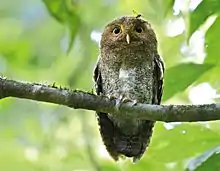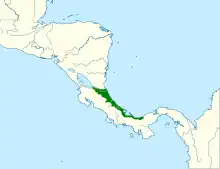Vermiculated screech owl
The vermiculated screech owl (Megascops guatemalae vermiculatus), is a subspecies, or possibly separate species, of owl in the family Strigidae. It is found in Costa Rica, Nicaragua, and Panama.[3][4]
| Vermiculated screech owl | |
|---|---|
 | |
| Scientific classification | |
| Domain: | Eukaryota |
| Kingdom: | Animalia |
| Phylum: | Chordata |
| Clade: | Dinosauria |
| Class: | Aves |
| Order: | Strigiformes |
| Family: | Strigidae |
| Genus: | Megascops |
| Species: | |
| Subspecies: | M. g. vermiculatus |
| Trinomial name | |
| Megascops guatemalae vermiculatus (Ridgway, 1887) | |
 | |
| Synonyms | |
|
Megascops guatemalae vermiculatus | |
Taxonomy and systematics
The taxonomy of the vermiculated screech owl is unsettled. The North American Classification Committee of the American Ornithological Society (AOS/NACC)), the International Ornithological Committee (IOC), and the Clements taxonomy treat it as a subspecies of the Middle American screech owl (M. guatemalae).[3][5] [6] BirdLife International's Handbook of the Birds of the World treats it as a separate species.[4]
What is now the foothill screech owl (M. roraimae) was once considered a subspecies of the vermiculated screech owl.[3]
Description
The vermiculated screech owl is 20 to 23 cm (7.9 to 9.1 in) long and weighs 91 to 128 g (3.2 to 4.5 oz). It is dimorphic, with one morph brown and the other overall rufous. Unlike most other owls of the same genus, it has feathered feet. The brown morph has a light brown facial disc with a thin dark border, indistinct pale brows over yellow eyes, and short dark "ear" tufts. Its crown and upperparts range from grayish brown to buffy brown with fine uniform vermiculations. The underparts are whitish with dense fine brown and black vermiculation. The beak is gray-green. The rufous morph is bright rufous on its head and upperparts.[7]
Distribution and habitat
The vermiculated screech-owl is found from far southern Nicaragua through the Caribbean side of Costa Rica into western Panama. It inhabits humid forest from sea level to about 1,200 m (3,900 ft).[7]
Behavior
Feeding
Almost nothing is known about the vermiculated screech owl's hunting practices or diet. It is presumed to mostly eat large insects but also small vertebrates.[7]
Breeding
The vermiculated screech owl's breeding phenology is also very poorly known. It nests in a natural tree cavity or abandoned woodpecker hole, apparently in March. The clutch size is thought to be three.[7]
Vocalization
The vermiculated screech owl's primary song is a "very fast, long, toad-like trill". Its probable secondary song is "a very brief descending purr".[7]
Status
The IUCN has assessed the vermiculated screech owl as being of Least Concern.[1] However, because it needs unbroken forest, "[f]orest destruction a threat, at least in long term."[7]
References
- BirdLife International (2016). "Vermiculated Screech-owl Megascops vermiculatus". IUCN Red List of Threatened Species. 2016. Retrieved 5 August 2021.
- "Appendices | CITES". cites.org. Retrieved 2022-01-14.
- Gill, F.; Donsker, D.; Rasmussen, P., eds. (July 2023). "Owls". IOC World Bird List. v 13.2. Retrieved July 31, 2023.
- HBW and BirdLife International (2022) Handbook of the Birds of the World and BirdLife International digital checklist of the birds of the world. Version 7. Available at: https://datazone.birdlife.org/userfiles/file/Species/Taxonomy/HBW-BirdLife_Checklist_v7_Dec22.zip retrieved December 13, 2022
- Chesser, R. T., S. M. Billerman, K. J. Burns, C. Cicero, J. L. Dunn, B. E. Hernández-Baños, R. A. Jiménez, A. W. Kratter, N. A. Mason, P. C. Rasmussen, J. V. Remsen, Jr., and K. Winker. 2023. Check-list of North American Birds (online). American Ornithological Society. https://checklist.americanornithology.org/taxa/
- Clements, J. F., T. S. Schulenberg, M. J. Iliff, T. A. Fredericks, J. A. Gerbracht, D. Lepage, S. M. Billerman, B. L. Sullivan, and C. L. Wood. 2022. The eBird/Clements checklist of birds of the world: v2022. Downloaded from https://www.birds.cornell.edu/clementschecklist/download/ retrieved November 10, 2022
- Holt, D. W., R. Berkley, C. Deppe, P. L. Enríquez, J. L. Petersen, J. L. Rangel Salazar, K. P. Segars, K. L. Wood, G. M. Kirwan, and J. S. Marks (2020). Middle American Screech-Owl (Megascops guatemalae), version 1.0. In Birds of the World (S. M. Billerman, B. K. Keeney, P. G. Rodewald, and T. S. Schulenberg, Editors). Cornell Lab of Ornithology, Ithaca, NY, USA. https://doi.org/10.2173/bow.vesowl.01 retrieved August 5, 2021
Further reading
- König, C., F. Weick & J.H. Becking (2008) Owls of the World. Christopher Helm, London, ISBN 978-0-7136-6548-2
